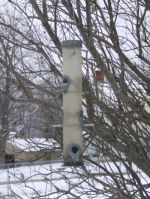
|
||
|
|
|
|
| Forgot Password | ||
Prevention of Spreading of Diseases at Birdfeeders
Posted by redstar |
Added on : March 23, 2010 2:07pm |
Last edited: June 14, 2010 04:43am | Viewed 3316 times
| 0 Comments | This article is also in birds
and birds
No backyard birder likes to see a weak, struggling bird at their feeders, and there are ways to prevent spreading diseases at your birdfeeders to help keep local bird populations strong and healthy. While bird diseases cannot be prevented – wild birds don’t wash up before eating and aren’t picky about hygiene – it is possible to minimize the effect of disease outbreaks if you know what to look for and what steps to take when sick birds appear.
 The first step toward avoiding backyard bird diseases is to know what to look for. Wild birds can become infected by a number of diseases, including:
The first step toward avoiding backyard bird diseases is to know what to look for. Wild birds can become infected by a number of diseases, including:
· Salmonella poisoning
· Avian pox
· West Nile virus
· Mycoplasmal conjunctivitis
· Aspergillosis
While the symptoms of these illnesses can vary even among birds of the same species, sick birds may have specific characteristics such as:
· Loss of feathers
· Swollen eyes or membranes
· Visible lesions or pustules
· Excessive mucus from eyes or bill
· Trouble breathing
· Poor reactions to human presence
· Erratic behavior
While these symptoms can alert birders to possible disease outbreaks at their feeders, many birds will not exhibit easily observable symptoms of illness or distress. In many cases, the first sign of illness is dead birds that do not show trauma or injuries. When birders find dead or ill birds, however, they can minimize the effects of a disease outbreak by taking simple steps in their own backyard.
· Clean feeders
· Clean ground
· Spread out feeders
· Inspect seed supplies
· Remove feeders
· Dispose of dead birds
· Contact the authorities
While you should clean feeders regularly, more frequent and more vigorous cleanings may be necessary during a disease outbreak. Clean the ground beneath feeders thoroughly and trim grass and plants as short as possible to minimize infected surfaces. During a disease outbreak, remove feeders with large number of perches and opt for designs that give birds more space. Immediately discard any questionable seed so it will be out of reach of wild birds. Birds from different flocks often congregate at the same feeders and can spread diseases quickly, but without that food source they are less likely to come into contact with one another. Dispose of dead birds immediately and in a way that will not be accessible to other birds, pets or wildlife. Contact your local wildlife services office, wildlife rehabilitator or Audubon chapter to report if you find more than one bird in a short period of time, or if you find several birds of the same species that have been affected. They can help determine the cause of the bird deaths and will be able to spread warnings to the community to help minimize the impact of any disease outbreak.
Many types of bird diseases can also cause infections in humans, and conscientious birders will take the necessary steps to protect themselves even as they work to minimize the outbreak’s affect on local bird populations.
· Always wear gloves when handling birds or cleaning and refilling feeders.
· Wash your hands thoroughly after handling birds or feeders, even if gloves were worn.
· Do not bring sick or dead birds indoors at any time.
· Keep children and pets away from bird feeding areas.
· Listen to local newscasts to stay abreast of bird disease outbreaks.
By knowing how to recognize bird diseases and understanding what steps to take when illness occurs, birders can minimize the outbreak among their backyard birds and keep local bird populations healthy and thriving.
 The first step toward avoiding backyard bird diseases is to know what to look for. Wild birds can become infected by a number of diseases, including:
The first step toward avoiding backyard bird diseases is to know what to look for. Wild birds can become infected by a number of diseases, including:



Be the first one to comment on this article